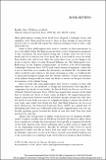Bradley, Ben. Well-Being and Death.
Author(s)
Hare, Caspar
DownloadHare_Well-being and death.pdf (41.07Kb)
PUBLISHER_POLICY
Publisher Policy
Article is made available in accordance with the publisher's policy and may be subject to US copyright law. Please refer to the publisher's site for terms of use.
Terms of use
Metadata
Show full item recordAbstract
Many philosophers writing about death have adopted a strikingly cheery and optimistic tone. Their goal has been to show us that, though we may lack immortal souls, we should still regard the oblivion hurtling toward us with a calm and steady eye.
Some of these philosophers have tried to convince us that nonexistence is not so dreadful a thing. The Epicureans invoked a variety of ingenious arguments to this conclusion, the most famous being this: it makes sense for you to fear death only if it is bad for you to be dead. But it is not bad for you to be dead. Your death is the end of you. After the event there is no you for things to be good or bad for. More recently, Bernard Williams (in “The Makropulos Case: Reflections on the Tedium of Immortality,” in Problems of the Self [Cambridge: Cambridge University Press, 1973]) had a more nuanced argument: a finite life is not so bad when you consider the alternative, an infinite life. An infinite life either would become tedious to the point of having no value, or would involve so much psychological change that the vibrant existence of later incarnations of the infinite being would not satisfy any desire to survive on the part of earlier incarnations of the infinite being.
Date issued
2011-07Department
Massachusetts Institute of Technology. Department of Linguistics and PhilosophyJournal
Ethics
Publisher
University of Chicago Press
Citation
Hare, Caspar. “Bradley, Ben. Well-Being and Death .” Ethics vol. 121, no. 4, July 2011, pp. 797–799.
Version: Final published version
ISSN
0014-1704
1539-297X